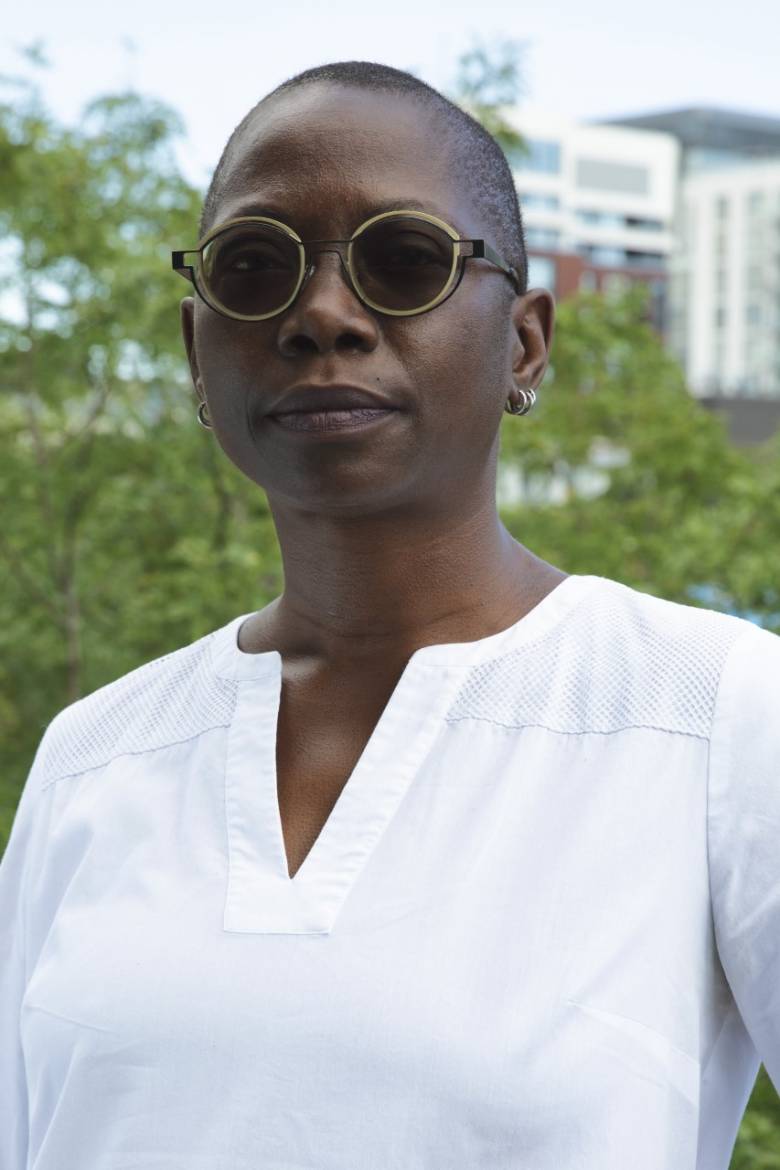December 16, 2020

OCAD University congratulates Dr. Andrea Fatona, Associate Professor, Faculty of Art, on being named Tier 2 Canada Research Chair in Canadian Black Diasporic Cultural Production.
Dr. Fatona, an independent art curator and scholar, and former director of the Graduate Program in Criticism and Curatorial Practice, has been working for years to rectify the absence of Black visual art from “official records”— art critics’ reviews, art archives and other avenues of representation.
The announcement was made jointly by The Canada Research Chairs Program (CRC) and The Canada Foundation for Innovation (CFI), with a $14 million award to research infrastructure to Canada Research Chairs. The CFI, in collaboration with the CRC, developed the JELF-CRC partnership to create competitive packages for the funding of infrastructure and research support at institutions. The John R. Evans Leaders Fund (JELF) is a valuable strategic investment tool designed to help institutions do just this.
Dr. Fatona’s research program will make visible and provide access to the works of contemporary Black artists, craftspeople, curators, and critics in Canada who have been historically erased from the imaginary of Canadian visual culture.
The program aims to expand our understanding of Canadian Black contemporary cultural production from 1987 to the present. The first resource of its kind, this research will raise awareness of the important role of Black artists in the histories of the visual and media arts in Canada.
“Dr. Fatona is a scholar with an impeccable capacity and long history of community building,” says Dr. Ashok Mathur, Interim Vice-President of Research & Innovation at OCAD University. “She is highly respected in her field of study, and the work she has already accomplished resonates nationally and internationally. Dr. Fatona will join a roster of talented CRCs at OCAD U and we look forward to working with her on her ambitious and very timely research plan.”
The overall aim of the research program is to develop a dynamic online space of encounter with curatorial projects, artworks, and discursive materials produced by/or about Black Canadian cultural producers, consisting of two interrelated projects: Re-coding Black Canada, and The State of Blackness Platform (SBP).
In June 2020, Dr. Fatona launched a re-imagined website, The state of blackness: from production to presentation, which began as a way for her to document the proceedings of the OCAD U conference she spearheaded in 2014. Funded by the Social Sciences and Humanities Research Council, the two-day event brought together artists, curators and academics to examine the histories, current status and future state of Black diasporic artistic practice and representation in Canada.
Dr. Fatona is the recipient of awards from Canada Council for the Arts, Ontario Arts Council, the Social Sciences and Humanities Research Council of Canada, and was the 2017/18 OCAD U-Massey Fellow. She has published scholarly articles, catalogue essays, and book chapters in a range of publications.
OCAD University currently has an allocation of four Canadian Research Chairs.
About the Centre for the Study of Black Canadian Diaspora:
The Centre for the Study of Black Canadian Diaspora (CSBCD) at OCAD University; a first-in-the-world centre for the study of contemporary Black Canadian cultural production and dissemination to be led by the Canada Research Chair in Canadian Black Diasporic Cultural Production, Dr. Andrea Fatona. The CSBCD will provide the infrastructure required to support Dr. Fatona’s ambitious research program. In particular, the activities of the Centre seek to write contemporary Canadian Black cultural producers back into the histories of who produces art in Canada through the cataloguing of Black curatorial projects from1987 to the present.
The research conducted within the Centre for the Study of Black Canadian Diaspora will highlight the ongoing contributions of Black Canadian cultural producers to Canadian culture and the making of the nation. The SBP and its contents are salient to expanding the understanding of Canadian contemporary art as it positions Black producers and Black visual and media arts centrally within the framework of Canadian art. This positioning will allow fellow citizens to appreciate the diverse range of aesthetics and practices that comprise the category of Canadian contemporary art. The activities of the Centre will benefit a broad range of individuals and stakeholders in the field of the visual and media arts, and education including artists, curators, scholars, educational institutions, galleries, policymakers, and multiple publics.
Source: OADU

